剑桥国际英语教程(入门级)4单元上
- 格式:ppt
- 大小:324.50 KB
- 文档页数:18
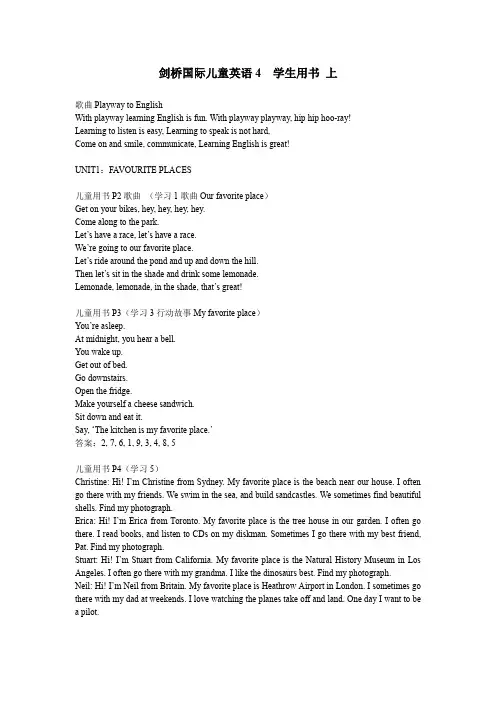
剑桥国际儿童英语4 学生用书上歌曲Playway to EnglishWith playway learning English is fun. With playway playway, hip hip hoo-ray!Learning to listen is easy, Learning to speak is not hard,Come on and smile, communicate, Learning English is great!UNIT1:FAVOURITE PLACES儿童用书P2歌曲(学习1歌曲Our favorite place)Get on your bikes, hey, hey, hey, hey.Come along to the park.Let’s have a race, let’s have a race.We’re going to our favorite place.Let’s ride around the pond and up and down the hill.Then let’s sit in the shade and drink some lemonade.Lemonade, lemonade, in the shade, that’s great!儿童用书P3(学习3行动故事My favorite place)You’re asleep.At midnight, you hear a bell.You wake up.Get out of bed.Go downstairs.Open the fridge.Make yourself a cheese sandwich.Sit down and eat it.Say, ‘The kitchen is my favorite place.’答案:2, 7, 6, 1, 9, 3, 4, 8, 5儿童用书P4(学习5)Christine: Hi! I’m Christine from Sydney. My favorite place is the beach near our house. I often go there with my friends. We swim in the sea, and build sandcastles. We sometimes find beautiful shells. Find my photograph.Erica: Hi! I’m Erica from Toronto. My favorite place is the tree house in our garden. I often go there. I read books, and listen to CDs on my diskman. Sometimes I go there with my best friend, Pat. Find my photograph.Stuart: Hi! I’m Stuart from California. My favorite place is the Natural History Museum in Los Angeles. I often go there with my grandma. I like the dinosaurs best. Find my photograph.Neil: Hi! I’m Neil from Britain. My fa vorite place is Heathrow Airport in London. I sometimes go there with my dad at weekends. I love watching the planes take off and land. One day I want to be a pilot.儿童用书P5(学习6真话假话)真话:Christine is from Sydney. Her favorite place is the beach.Erica is from Toronto. Her favorite place is a tree house.Stuart is from California. Her favorite place is a museum.Neil is from Britain. His favorite place is Heathrow Airport.假话(举例):Erica is from Sydney. Here favorite place is Heathrow Airport.Christine is from Toronto. Her favorite place is a museum.Neil is from California. His favorite place is a tree house.Stuart is from Britain. His favorite place is the beach.儿童用书P6、7(学习7卡通故事Max at the rodeo)Linda: Let’s go to the rodeo.Benny: Yes, let’s.Max: Great idea.Audience: Cool! Fantastic! Wow!Max: Can I try?Benny: No, Max!Linda: It’s dangerous.Max: Please let me try.Benny: No, Max.Linda: No way, Max!Benny: He’s really great.Linda: Yes, he’s fantastic.Max: Can I try, please?Cowboy: Yes, of course. What’s your name? Ladies and gentlemen, this is Max, the best rodeo rider in the world.Benny: Stop, Max!Linda: Come back, Max!Max: Help! Help!Audience: Ha ha ha ha! Hee hee hee hee!Man: The best rodeo rider in world Ha ha ha ha. Stop thief! My money!Max: Oh, I’m so sorry!Sheriff: Thank you, Max. This man is a thief. Here’s your money.Man: Thank you very much, Max. Here’s a hundred dollars for you.Cowboy: Max, come and try again.Max: No, thanks.Max: Let’s have some ice cream.Benny and Linda: Great idea, Max!UNIT2:WHAT DO YOU COLLECT儿童用书P8 (学习1歌曲Hector, the collector)请见儿童用书P8儿童用书P9(学习2涂色)Take a blue crayon. Color the following numbers blue:44, 90, 32, 11, 92, 16, 27, 13, 21, 35, and 18.That’s it. Now take an orange crayon. Color the following numbers ora nge: 55, 60, 28, 66, 34, 73, 99, 74, 38, 96, 41, 58, 47, 77, 19, and 80. Excellent. And now take a red crayon. Color the following numbers red: 84, 49, 68, 52, 12, 63, 51, 36, 24, 33, and 75.答案: CDs儿童用书P10(学习4采访)Interview 1:Interviewer: What do you collect, Mona?Mona: Soft toys.Interviewer: Nice. How many soft toys have you got?Mona: Thirty.Interview 2:Interviewer: Juliet, what do you collect?Juliet: Computer games.Interviewer: Interesting. How many have you got?Juliet: Eighteen.Interviewer: That’s a lot!Interview 3:Interviewer: What do you collect, Cliff?Cliff: Football pictures.Interviewer: Oh, really? How many have you got?Cliff: Seventy-eight, I thinkInterview 4:Interviewer: What do you collect, David?David: Stamps.Interviewer: And how many have you got?David: Only forty. I’ve just started.儿童用书P11(学习6行动故事The shell)One. Put the shell in your pocket.Two. Oh! A crab’s coming out of the shell.Three. You’re on the beach.Four. The crab waves at you.Five. Look for shells.Six. Take the shell home.Seven. Smile.Eight. Show the shell to your mum.Nine. You see a big, beautiful shell.Ten. Put the shell on the sand.Eleven. Pick the shell up.Twelve. Run back to the beach.答案:3, 5, 911, 1, 68, 2, 1210, 4, 7UNIT3:FAMIL Y AND FRIENDS儿童用书P14(学习1歌曲My best friend)请见儿童用书P14儿童用书P14(学习2听录音填名字)Vicky has got long fair hair, blue eyes, a small mouth, small ears and a big nose.Sarah has got short black hair, brown eyes, a small nose, big ears and a wide mouth.Peter has got a wide mouth, short brown hair, big ears, a small nose and grey eyes.Helen has got a big nose, short brown hair, a small mouth, green eyes and small ears.Barry has got a big nose, short brown hair, a small mouth, green eyes and small ears.答案:Sarah, Peter, Helen, Barry, Vicky儿童用书P14(学习3填名字)She has got short black hair, brown eyes, a small nose, big ears and a wide mouth. What’s her name? (Sarah)She has got long fair hair, blue eyes, a small mouth, small ears and a big nose. What’s her name? (Vicky)He has got a big nose, short brown hair, a small mouth, green eyes and small ears. What’s his name? (Barry)He has got a wide mouth, short brown hair, big ears, a small nose and grey eyes. What’s his name? (Peter)儿童用书P15(学习4填数字)Derek likes swimming.Helen likes roller-blading.Adam likes skating.Claudia likes playing tennis.Monica likes sailing.Barbara doesn’t like shopping.Kate doesn’t like skiing.Michael doesn’t like playing computer games.Paul doesn’t like dancing.Jennifer likes playing football.Brain doesn’t like sailing.Ken doesn’t’ like watching TV.答案:4, 8, 5, 211, 9, 1, 312, 6, 10, 7儿童用书P17(学习6采访Julie和Mark)Interview 1:Interviewer: Hi, what’s your name?Julie: I’m Julie.Interviewer: Have you got a brother or a sister, Julie? Julie: I haven’t got a sister, but I’ve got a brother. Interviewer: What’s his name?Julie: Jamie.Interviewer: How old is hi?Julie: Eleven.Interviewer: Has he got a pet?Julie: yes, a dog.Interviewer: What does Jamie like?Julie: Erm… he likes swimming and roller-blading. Interviewer: Does he like music?Julie: No, he doesn’t.Interviewer: Thanks, Julie.Julie: That’s OK.Interview 2:Interviewer: What’s your name?Mark: I’m Mark.Interviewer: Have you got a brother or a sister, Mark? Mark: I’ve got a sister.Interviewer: Uhuh. What’s her name?Mark: Alison.Interviewer: How old is she?Mark: Ten.Interviewer: Has she got a pet?Mark: Yes, a white mouse.Interviewer: What does Alison like?Mark: Erm… she likes playing football and listening to CDs. Interviewer: Does she like playing computer games? Mark: No, she does n’t.Interviewer: Thanks, Mark. Bye-bye.Mark: Bye.儿童用书P18, 19(学习8行动故事A letter for Lynn)Nick: Dear Lynn, let’s meet in the part on Saturday at five. Nick.To Lynn. I hope she has time.Nick’s friend: This is Lynn’s house.Jenny: There’s a letter for Lynn.Tom: Open it.Jenny: She’s got a boyfriend.C hris: It’s a love letter.Tom: Ha ha ha.Lynn: That’s unfair.Chris: Stop crying, you baby.Nick (to himself): It’s so unfair. What can I do? Dear Lynn…Chris: Look. There’s another letter for our crybaby.Jenny: Open it, Chris.Chris: Dear Lynn, come to t he big oak tree in the park at five today. I’ve got a surprise for you. Tom: What’s the time?Jenny: Half past four. Let’s hurry.Chris: Where are they?Jenny: There’s a letter.Tom: Open it.Bad luck. Don’t forget it’s unfair to read other people’s l etters. Nick and Lynn.Nick: let’s have some candy floss.Lynn: Alright.UNIT4:THE SPOOKY CASTLE儿童用书P21(学习1回答问题)How many spiders are there? (16 spiders)How many bats are there? (13 bats)How many rats are there? (9 rats)One spider likes apples. What color is it? (green)Two rats like chocolate. What color are they? (grey)What’s the big ghost’s name? (Edmund)What’s the small ghost’s name? (Edwin)Where is the big ghost’s pen? (on the bed)Where are the big ghost’s roller blades? (under the bed)Wh ere is the small ghost’s watch? (on the sofa)儿童用书P22(学习3歌曲The spooky castle)请见儿童用书P22儿童用书P23(学习5逻辑游戏)Angus likes singing. He doesn’t like dancing.Edwin likes singing and he likes watching TV.Victor doesn’t like singing. He likes playing tennis.Stan likes playing tennis. He doesn’t like watchi ng TV.Fergus likes dancing. He doesn’t like playing tennis.儿童用书P24, 25(学习6故事Two tickets for ‘The Green Monster’)Ghost 1: It’s so boring here, Edwin.Ghost 2: You’re right. What can we do?Ghost 1: Let’s go and see a film.Ghost 2: Great idea! Excuse m e, where’s the Top Cinema?Girl: It’s in Station Road. Opposite the museum.Ghost 1: Thank you, my litter monster.Ghost 2: Letter monster… Ha ha ha.Ghost 1: Two tickets for ‘The Green Monster’Cashier: Six pounds.Ghost 1: Here you are, you monster.Ghos t 2: Ha ha ha. I’m hungry.Ghost 1: Let’s get some popcorn.Ghost 2: How much is the popcorn?Assistant: One pound.Ghost 1: Give me the popcorn.Boy: Please be quiet.Ghost 2: Have some popcorn, you little monster.Ghost 1: Ha ha ha.Boy: I’m scared.Ghost 2: Look at the monster.Ghost 1 and 2: Ha ha ha.Ghost 1: Give me some popcorn.Ghost 2: It’s on the floor. Ha ha ha. Oh no! A mouse!Ghost 1: Let’s run!Ghost 2: Help, help!Ghost 1: A mouse.Children: Hee hee hee.UNIT5:AT HOME儿童用书P26(学习1听并涂色)Th e wardrobe in Tom’s room is yellow.The bathroom floor is blue.The sofa in the living room is green.The chairs in the kitchen are red.The lamps in the bedroom are orange.The bookcase in Kate’s room is pink.And what’s that? Look.There’s a cat in the attic. It’s brown.儿童用书P27(学习2贴句子)Where are Tom’s socks? On the sofa in the living room.Where is his cap? On the wardrobe in his room.Where are his jeans? They are under his bed.Where is his schoolbag? It’s behind his bed.Where are Kate’s trainers? Under the table in th e kitchen.Where is her T-shirt? In the bathroom.Where is her sweater? On the stairs in the hall.Where is her umbrella? It is behind the sofa.儿童用书P27(学习3贴句子)Situation 1: Someone is cleaning her teeth, then gargling.Situation 2: Noises of someone banging pots, stirring, tasting.Situation 3: Sound of someone switching on TV. Then some scary sounds and noise of girl being scared.Situation 4: Sound of someone snoring, then sound of someone breathing regularly.答案:Mum is in the bathroom. She is cleaning her teeth.Dad is in the kitchen. He is cooking.Kate is in the living room. She is watching TV.Tom is in his room. He is sleeping.儿童用书P28(学习4听录填充房间)In my room, the desk is in front of the window with the blue curtains.There is a chair behind the desk.The bed is opposite the desk, in front of the small window with the red curtains.My wardrobe is between the two small windows opposite the door.儿童用书P29(学习6歌曲The raccoon in my room)请见儿童用书P29儿童用书P30, 31(学习7故事The hats in the attic)Benny: What can we do, Linda?Linda: Let’s go to the attic. There are lots of old things up there.Benny: Look at that!Linda: Wow. It looks really old. Let’s open it.Benny: What a crazy hat.Linda: There’s another one. Let’s put them on. Who are these men?Benny: I don’t know. I’m scared.Prince 1: Who are you?Benny: I’m Benny.Linda: I’m Linda.Prince Rupert: Welcome, Prince Benny. Welcome, Princess Linda. I’m Prince Rupert.Prince 2: Sh! The king and the princess are coming. Here’s the golden shoe. Try it on. It m ust fit you. Then you can marry the princess. It doesn’t fit Prince Rupert.Prince Gregory: Rupert, give it to me. It’s my turn now.King: It doesn’t fit Prince Gregory. Ha! You can’t marry my daughter. The golden shoe doesn’t fit. Who are you?Benny: I’m Benny.King: Try on the shoe. Hurrah, it fits you!Princess: Prince Benny, marry me.Benny: Marry you? I can’t. I’m only 10. Linda, help me!Linda: Take the hat off.Benny: Oh! Thanks, Linda.Linda: Phew!Mum: Benny, Linda! What are you doing in the attic? And what’s that?Benny and Linda: Ha ha ha!UNIT6:FOOD儿童用书P32(学习1 Chant)请见书32页。
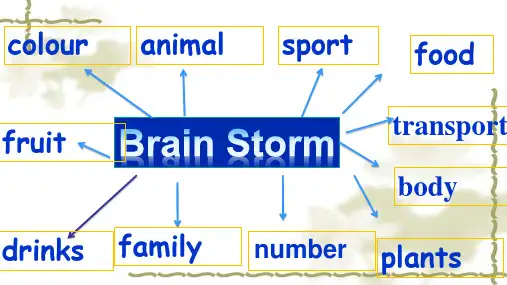
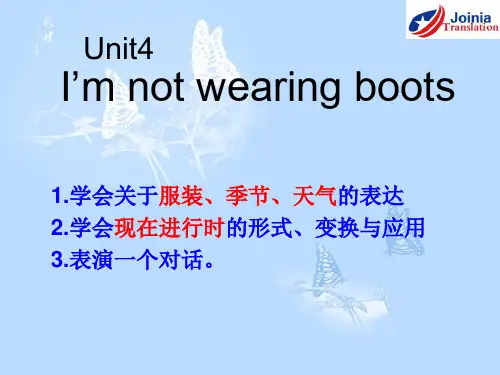

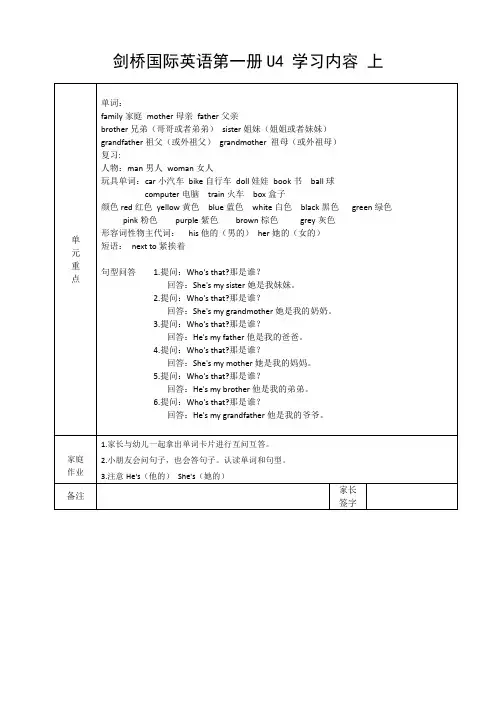
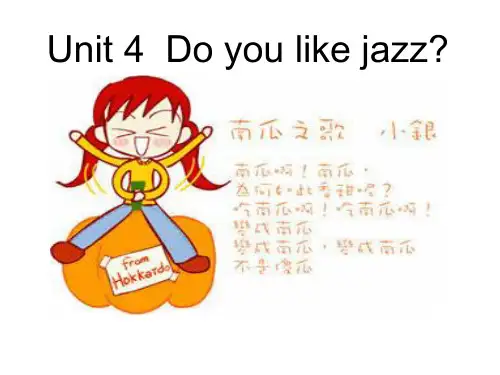
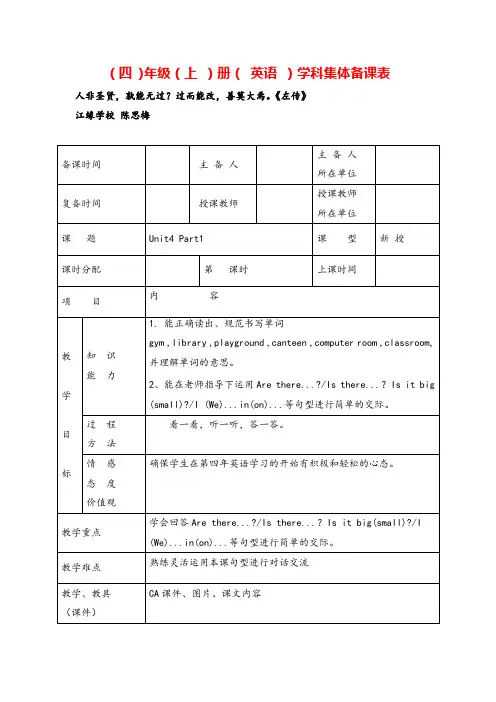
(四)年级(上)册(英语)学科集体备课表人非圣贤,孰能无过?过而能改,善莫大焉。
《左传》
江缘学校陈思梅
(四 )年级(上)册(英语)学科集体备课表
(四 )年级(上)册(英语)学科集体备课表
【素材积累】
不要叹人生苦短,若把人一生的足迹连接起来,也是一条长长的路;若把人一生的光阴装订起来,也是一本厚厚的书。
开拓一条怎样的路,装订一本怎样的书,这是一个人生命价值与内涵的体现。
有的人的足迹云烟一样消散无痕,有的人却是一本耐读的厚书,被历史的清风轻轻翻动着,给一代又一代的人以深情的启迪与深刻的昭示。
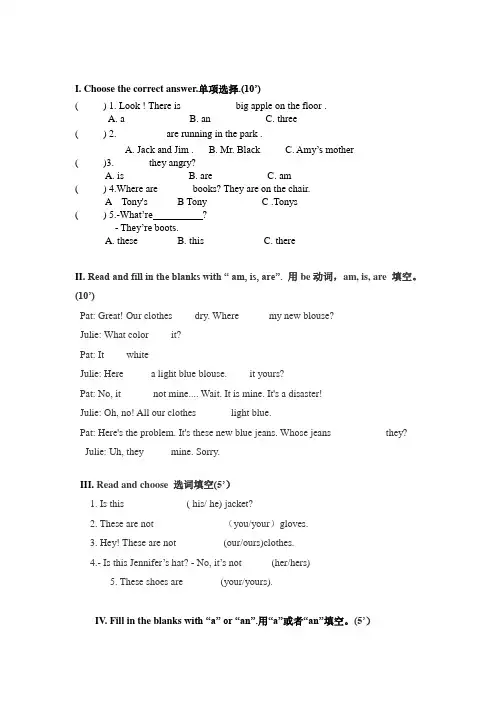
I. Choose the correct answer.单项选择.(10’)( ) 1. Look ! There is __________ big apple on the floor .A. aB. anC. three( ) 2. _________ are running in the park .A. Jack and Jim .B. Mr. BlackC. Amy’s mother( )3. ______ they angry?A. isB. areC. am( ) 4.Where are ______ books? They are on the chair.A Tony'sB TonyC .Tonys( ) 5.-What’re?- They’re boots.A. theseB. thisC. thereII. Read and fill in the blanks with “ am, is, are”. 用be动词,am, is, are 填空。
(10’)Pat: Great! Our clothes ____dry. Where _____ my new blouse?Julie: What color____ it?Pat: It____ whiteJulie: Here _____a light blue blouse. ____it yours?Pat: No, it ______not mine.... Wait. It is mine. It's a disaster!Julie: Oh, no! All our clothes ______ light blue.Pat: Here's the problem. It's these new blue jeans. Whose jeans _________they? Julie: Uh, they_____ mine. Sorry.III. Read and choose 选词填空(5’)1. Is this ____________( his/ he) jacket?2. These are not ____________(you/your)gloves.3. Hey! These are not _________(our/ours)clothes.4.- Is this Jennifer’s hat? - No, it’s not______(her/hers)5. These shoes are _______(your/yours).IV.Fill in the blanks with “a” or “an”.用“a”或者“an”填空。
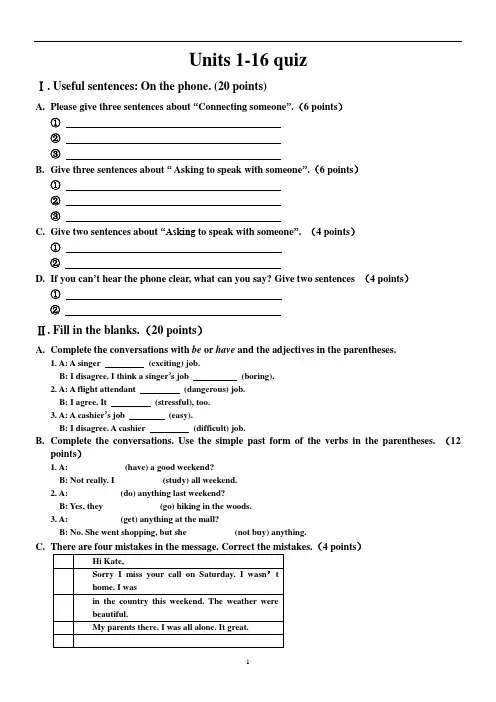
Units 1-16 quizⅠ. Useful sentences:On the phone. (20 points)A.Please give three sentences about “Connecting someone”.(6 points)①②③B.Give three sentences about “ Asking to speak with someone”.(6 points)①②③C.Give two sentences about “Asking to speak with someone”. (4 points)①②D.If you can’t hear the phone clear, what can you say? Give two sentences (4 points)①②Ⅱ. Fill in the blanks.(20 points)plete the conversations with be or have and the adjectives in the parentheses.1. A: A singer (exciting) job.B: I disagree. I think a singer’s job (boring).2. A: A flight attendant (dangerous) job.B: I agree. It (stressful), too.3. A: A cashier’s job (easy).B: I disagree. A cashier (difficult) job.plete the conversations. Use the simple past form of the verbs in the parentheses. (12points)1. A: (have) a good weekend?B: Not really. I (study) all weekend.2. A: (do) anything last weekend?B: Yes, they (go) hiking in the woods.3. A: (get) anything at the mall?B: No. She went shopping, but she (not buy) anything.C.There are four mistakes in the message. Correct the mistakes.(4 points)Hi Kate,Sorry I miss your call on Saturday. I wasn’thome. I wasin the country this weekend. The weather werebeautiful.My parents there. I was all alone. It great.Talk to you soon,BrendaD.Unscramble the sentences.(4 points)1.(the; there isn’t; a mirror; in; bedroom)2. (no; pictures; the hall; there are; in)Ⅲ. Reading. (40 points)AEvery year there is a Spring Festival in China. Usually it is in January or February. It is the most important festival in China. So before it comes,everyone has to prepare things. They buy pork,beef,chicken,fruits and many other things. And they often make a special kind of food—“dumplings”. It means “come together”.On the day before the festival,parents buy new clothes for their children. Children also buy presents for their parents. On the Spring Festival Eve(除夕),all the family members come back to their hometown. This is a happy moment. Some sing and dance,some play cards and others get the dinner ready. When they enjoy the meal,they give each other the best wishes for the coming year. They all have a good time.1. Which is the most important festival in China?A. The Mid-Autumn Festival.2. When the Chinese Spring Festival is usually celebrated?A. In March or April.B. In May or June.3. What is the special kind of food for the Spring Festival in China?A. ChickenB. Dumpling4. What’s the meaning of the food “dumplings” for Chinese people in the Spring Festival?A. Look up.B. Help yourself.5. The familyA. give each other the best wishesC. sing,BStress(压力)is everywhere in our everyday life. Not only men have it, but also women and young people. The most important reasons of stress are:death, diseases, exams, making money, getting married, moving houses, changing jobs, ending friendships and so on.How do you know whether you have stress? Could you give your answers to the following questions?Yes or NoDo you easily get angry?Do you often sleep badly?Do you get headaches a lot?Do you take sleeping pills?Do you find it difficult to relax?Do you usually hide your feelings?Do you smoke and drink a lot to keep quiet?Do you find it difficult to put your heart into something?If you answer “Yes” to more than two of these questions, you are one of those people with stress. So what can you do about it?Doing relaxing exercises, talking with friends and listening to light music are all usual ways of relieving(减轻)stress. However, doctors now say that there are easier ways—people should laugh and smile more often. When you laugh and smile, your body relaxes. They also say that people, especially men, should cry more often, because crying is the natural way of relieving stress.6. Who has got stress in everyday life?A. Men and women.B. Young people.C. Both A and B.7. If you have over problems listed in the table, you are the person with stress.A. twoB. threeC. eight8. Which of the followings is NOT the reason of stress?A. Taking exams.B. Taking sleeping pills.C. Making money.9. What’s the easier way to relax your body?A. Talking with friends.B. Doing relaxing exercises.C. Laughing, smiling and crying.10. The main idea of the passage is .A. about stress and how to relieve your stressB. that there are many reasons for having stressC. that laughing and smiling more can help relieve your stressCThe Water World Swimming Pool is open every day from eight o’clock in the morning until half past seven in the evening. It costs two dollars sixty to enter the pool. There is a special cheap price for students with a student card. The price is one dollar forty. But you must bring your student card with you.On Wednesday morning the pool is only open to mothers and babies. So mothers can enjoy themselves in the water with their babies. Please leave your older children at home on Wednesday morning.The new Water World Café will be open up on June 22nd. From the caféyou can watch the swimmers or enjoy a drink after you swim.Please call 2105369 for more information. We look forward to seeing you at the Water World Swimming Pool.11.How long is the Water World Swimming Pool open every day?A. Eleven hours.B. Seven hours.C. Eleven and a half hours.D. Seven and a half hours.12. What is the price for students with a student card to enter the pool?A. Two dollars.B. One dollar forty.C. Two dollars sixty.D. One dollar.13. A ten-year-old boy can’t go to the Water World Swimming Pool.A. on SaturdayB. on SundayC. on Wednesday afternoonD. on Wednesday morning14. From the café you can watch the swimmers or enjoy a drink after you swim ___________.A. on May 21stB. on May 22ndC. on June 23rdD. on June 21st15. This passage is a (n) .A. advertisementB. noteC. storyD. sloganDMr. Brown was going away for a week. Before he left, he said to his son, "If anyone asksfor me, you can tell him that your father has been out for doing something, and will be back ina week, then be sure to ask him to sit down for a cup of tea.""OK, Dad," said his son. But he was afraid his soncouldn't remember this, he wrote these words down on a piece of paper and gave it to him. His son put it into his small pocket, took it out and looked at it every now and then.Four days passed, but no one came to see his father. The boy thought that there was no man to come and that the piece of paper was of no more use for him, so he burnt it that evening.The next afternoon, someone knocked at the door. The boy opened it. A man was standing at the door and said, "Where is your father?" The boy put his hand into his pocket at once and looked for the piece of paper.He could not find it. He suddenly remembered he had burnt it, so he shouted, "No more.” The man was very surpri sed. He asked, "No more? I met your father last week. When did it happen?” Burnt yesterday evening."16. Mr. Brown told his son that _____.A. he would be away from home for four daysB. he would be back in seven daysC. he would be back in a monthD. he liked a cup of tea17. Mr. Brown wrote the words down on ________.A. the wallB. the doorC. a piece of paperD. his son's pocket18. A man came to visit the boy's father on ________.A. the second dayB. the third dayC. the fourth dayD. the fifth day19. The man was very surprised because _________.A. he thought the child's father was deadB. the child didn't ask him to sit downC. the child gave him a cup of teaD. he couldn't find that piece of paper20. What was burnt? ___________.A. The piece of paperB. Mr. SmithC. The visitorD. The boyⅣ. Translation. (20 points)1.The other students in the class must__ __________ _____ (闭着眼睛).2.You must look after yourself and____ ________________ (保持健康).3.._____________________ (顺便问一下), why did you call me?4.She wasn't here __ ______________ (刚才).5.They can watch the football match___ ___________ (同时).6.What are you going to be when you______________ (长大)?7.She___ _____________ (出生)in Tianjin .8.Where were you__ ___________ ___ (昨天上午)?9.I got here ______ ___ (半小时前).10..___ ______ (起先) I found it very difficult, but now I can understand most of the lessons. Ⅴ. Writing. (10 points)Find the differences.。

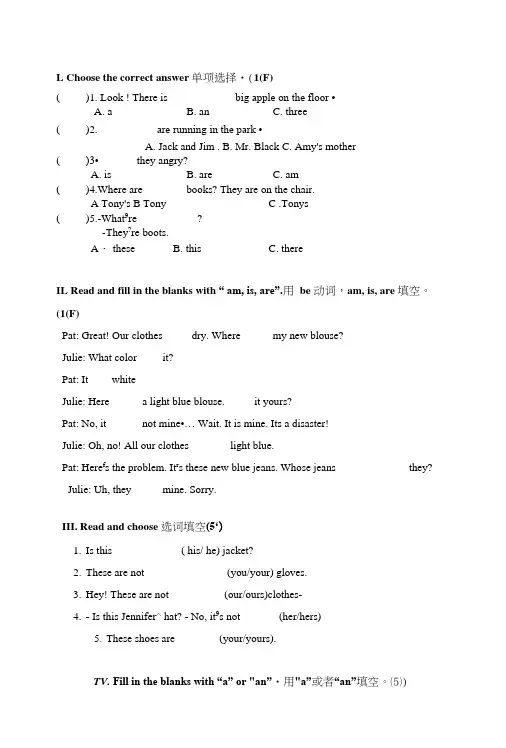
L Choose the correct answer单项选择・(1(F)( )1. Look ! There is ____________ big apple on the floor •A. aB. anC. three( )2. __________ are running in the park •A. Jack and Jim .B. Mr. BlackC. Amy's mother( )3•______ t hey angry?A. isB. areC. am( )4.Where are _______ books? They are on the chair.A Tony'sB TonyC .Tonys( )5.-What9re __________ ?-They?re boots.A・ these B. this C. thereIL Read and fill in the blanks with “ am, is, are”.用be 动词,am, is, are 填空。
(1(F)Pat: Great! Our clothes _____ dry. Where _____ m y new blouse?Julie: What color ___ it?Pat: It ___ whiteJulie: Here _____ a light blue blouse. ____ it yours?Pat: No, it ______ n ot mine•… Wait. It is mine. Its a disaster!Julie: Oh, no! All our clothes _______ light blue.Pat: Here f s the problem. It r s these new blue jeans. Whose jeans ____________ t hey? Julie: Uh, they ____ mine. Sorry.III. Read and choose 选词填空(5‘)1.Is this ____________ ( his/ he) jacket?2.These are not _____________ (you/your) gloves.3.Hey! These are not _________ (our/ours)clothes-4.- Is this Jennifer^ hat? - No, it9s not ______ (her/hers)5.These shoes are _______ (your/yours).TV.Fill in the blanks with “a” or "an”・用"a”或者“an”填空。
剑桥国际英语入门级到二级自学资料Unit 1 It’s nice to meet you. 第1单元见到你很高兴Exercise 1 CONVERSATION 练习1 会话Part A: Listen and practice A部分: 听和练习Exercise 2 SNAPSHOT 练习2 文化点滴Exercise 3 GRAMMAR FOCUS 练习3 语法要点Exercise 4 WORD POWER The alphabet 练习4 词汇扩展 字母表印刷体(五段式字母表):Aa Bb Cc Dd Ee Ff Gg HhIi Jj Kk Ll Mm Nn OoPp Qq Rr Ss Tt Uu Vv Ww Xx Yy Zz手写体:书写要求:格式正确,体式标准,书写整洁,页面美观Exercise 6 SAYING HELLO 练习6 打招呼1.Hi, Matthew. How are you? 你好,马修。
你怎么样?你好,马修。
怎样是你?Great! How about you, Lisa? 很好!你怎么样,利萨?很高!怎样关于你,利萨?2.Good morning, Mr. Duran. How are you? 早上好,杜朗先生。
你怎么样?好早上,先生,杜朗。
怎样是你?I’m just fine, Alex. Thank you. 我挺好的,阿来克斯。
谢谢你。
3.Good afternoon, Brad. How are you? 下午好,伯拉德。
你怎么样?好下午,伯拉德。
怎样是你?Not bad, thanks. How are you? 不错,谢谢。
你怎么样?不坏,谢谢。
怎样是你?4.Good evening, Mrs. Morgan. 晚上好,莫根太太。
好晚上,夫人莫根。
Hello, Ms. Chen. How are you? 你好,陈女士。
你怎么样?你好,女士陈。
怎样是你?I’m OK, thank you. 我还行,谢谢你。
Unit 4 What’s in my hat?教学目的和要求Teaching aims and demands 帮助学生进一步巩固单复数的概念,能够用所学的单词进行替换练习学习新句型,复习已经学过的词汇继续学习相关音素,复习已经学过的音素交际用语Expressions in communication This is my friend, Tony.It‟s our fun time today.What‟s in my hat?What‟s on the table?Who can make your own chant?Let me try!重点朗读词汇Key words and expressions a hat, a turtle, a table, a pig, a friend, a clock, a fisha baseball, a bird, a pen, a pouch, Tony, fun, time所需教具Materials for teaching 若干个已经学过的单词图片,尽量以复数形式出现与第二部分及第四部分相关的图片和单词卡片教师可以穿一件风衣,在里面的袋子里放一些东西,用来变魔术如何导入教学?上课时,教师手里拿一顶礼帽,并在礼帽里放一些与本课有关的东西和动物玩具。
进入教室后,教师说:“Hello, boys and girls, guess! What‟s in my hat? What‟s in my hat?” 凡是小朋友猜对的,教师就把东西拿出来,放在桌子上进行展示。
接着,教师说:“Hello! This is my friend, Tony. It‟s our fun time today.”接着,教师转身拿出小丑的图片,并装作小丑跟大家问好。
教师说:“Hello! Good morning! Please watch carefully! What‟s in my hat?” 说着说着,“小丑”就开始从礼帽里往外拿东西。
剑桥国际英语教程4教案剑桥国际英语教程4Unit 1Friends and familyContentsA. What kind of person are you?B. Every family’s different.Functions◆Describing personalities◆Expressing likes and dislikes◆Describing personal change◆Stating advantages and disadvantages◆Talking about rulesGrammar◆Gerunds◆Noun clauses after BEVocabulary◆Adjectives describing personality traitsDiscussion◆Finding out what personality traits you have in common with your classmates ◆Studying personality profiles◆Talking about how you have changed or how you would like to change◆Comparing families◆Talking about rules in your familyListening◆Three young people describe how they have changed◆Two people compare similari ties and differences between their families Writing◆Identifying the main idea in a paragraph◆Writing a paragraph about your most positive or negative qualityReading◆“upside-down families”: families where the children have too much controlUnit 2Educations and learningContentsA How can schools be improved?B What’s the best way to learn?Functions◆Stating facts◆Making recommendations◆Describing processes and strategies◆Giving reasons and purposes◆Talking about hopes and dreamsGrammar◆Should and ought to in the active and passive \◆Infinitives and gerunds to talk about how to do things◆In order to and so thatVocabulary◆Collocations relating to goalsDiscussion◆Making suggestions to improve schools◆Explaining how school prepares young people for life◆Stating your goals for the future◆Discussing different ways to learn somethingListening◆Two young people explain how they developed personallyat college◆Three people describe the strategies they used to learn something newWriting◆Choosing topic sentences◆Writing a paragraph about your educational beliefsReading◆“Home Schooling: A growing trend”: advantages and drawbacks of educatingchildren at homeUnit 3CitiesContentsA. Fascinating destinationsB. It’s my kind of cityFunctions◆De scribing and giving information about places◆Stating preferences◆Presenting contrasting information◆Categorizing and evaluating issuesGrammar◆Defining and non-defining relative clauses◆Order of adjectives◆Connecting contrasting ideasVocabulary◆Nouns referring to features of a city◆Nouns relating to quality-of-life issuesDiscussion◆Explaining why you would like to visit a particular city◆Choosing the right city for a particular purpose◆Deciding which city is best to live in◆Evaluating your hometown◆Discussing quality-to-life issuesListening◆ A TV show introduces two exciting cities◆Two foreign students explain what they like about their host city◆Two New Yorkers talk about life in their cityWriting◆Creating topic sentences◆Writing a paragraph about a place you knowReading“Get Yourself Lost”: The best way to enjoy sight-seeing in a new placeUnit 3Day and nightContentsA. Your energy profileB. Sweet dreamsFunctions◆Describing daily routines and habits◆Giving advice◆Explaining reasons and conditions◆Giving interpretations of meaningGrammar◆Time relationships◆Clauses stating reasons and conditionsVocabulary◆Collocations referring to sleep and dreamsDiscussion◆Discussing personal energy levels◆Classifying activities that raise or lower your energy level◆Giving advice on a radio call-in program◆Talking about sleeping habits◆Interrupting dreamsListening◆Three people describe methods they use to lower stress◆Two people describe their dreams and try to figure out what they mean Writing◆Choosing the best topic sentence◆Writing a paragraph about times of day, daily schedules, or relaxation. Reading“Ten Keys to a Better Night’s Sleep”: Tips on fulfilling a basic human needUnit 5Generally speakingContentsA. What is typical?B. Topics of concernFunctions◆Comparing customs and habits◆Presenting contrasting information◆Making generalizations◆Discussing concerns and offering solutions◆Describing a mental processGrammar◆Showing contrast and exception◆Quantifiers◆Conditional sentencesVocabulary◆Adjectives describing emotional reactions◆Nouns referring to public concernsDiscussion◆Talking about what’s advantage◆Discussing what makes you typical or unique◆Talking about future concerns◆Explaining your persona l concernsListening◆Three teenagers compare themselves to other people their own age◆Three people describe their different approaches to solving problemsWriting◆Identifying supporting statements◆Developing a paragraph with supporting statementsReading“Statistically Speaking”: the living arrangements, education level, and beliefs of the average American Unit 6Interpersonal communicationContentsA. Making conversationB. Personal secretsFunctions◆Describing types◆Talking about appropriate behavior◆Starting a conversation◆Making small talk◆Reporting what someone else has saidGrammar◆Infinitive and gerund phrases◆Reported speechVocabulary◆Adjectives describing positive and negative feelings Discussion◆Describing conversational styles and habits◆Giving advice for awkward social situations◆Determining appropriate topics for small talk◆Deciding if it is appropriate to tell secrets◆Reporting new about your classmatesListening◆Several people make small at a party◆Three people tell s ome interesting newsWriting◆Keeping a journal◆Writing your reaction to a good piece of news Reading“Don’t Be a Bore!”: How to be a good conversationalist.Unit 7Telling the newsContentsA. StorytellingB. What’s in the news?Functions◆Presenting information in chronological order◆Narrating news events◆Organizing and presenting topical information Grammar◆Adverbs with the past and past perfect◆Present perfect vs. past◆Past vs. past continuousVocabularyNouns referring to events in the newsDiscussion◆Telling stories about uncomfortable situations◆Talking about personal experiences◆Creating a story with your classmates◆Studying the different sections of a newspaper◆Presenting a news story of local interestListening◆Two people describe pe rsonal dilemmas◆An actress describes her most embarrassing moments◆ A radio broadcast highlights the top new stories of the day Writing◆Putting events in order◆Writing a narrative paragraphReading“Nutty’s News”: Humorous news articles about some strange eventsUnit 8ValuesContentsA. Growing upB. The wisdom of ageFunctions◆Expressing regrets about the past◆Referring to fortunate events in the past◆Evaluating traits of character◆Describing people’s attitudes and beliefsGrammar◆Should have and ought to have; wished about the past◆Adjectives of emotion+ past time clauses◆Noun clauses introduced by it◆Noun clauses introduced by verbsVocabulary◆Nouns referring to values and traits of character◆Adjectives describing personal attitudes◆Colloc ations relating to positive actionsDiscussion◆Talking about values you have learned◆Describing personal memories and regrets◆Giving advice to young people on getting the most out of life◆Stating personal beliefsListening◆An interviewer asks people a bout personal values◆Three people describe their role modelsWriting◆Choosing a thesis statement for a multi-paragraph composition◆Writing a composition about a significant time in your past Reading“It’s not so bad to be middle-aged”: some of the rewards of middle ageUnit 9Putting the mind to workContentsA. Exploring creativityB. Ideas that workFunctions◆Describing job qualifications◆Offering solutions to problems◆Commenting on facts◆Analyzing reasonsGrammar◆Reduced relative clauses◆No n-defining relative clauses as sentence modifiersVocabulary◆Nouns referring to creative qualities◆Collocations related to problem solving◆Nouns referring to inventionsDiscussion◆Describing jobs that require creativity◆Taking a creativity quiz◆Findi ng creative solutions to difficult problems◆Choosing inventions that have had a great impact on twentieth-century life◆Explaining why new products are inventedListening◆Three employees explain how their jobs are creative◆Three people devise imaginary inventionsWriting◆Choosing new paragraph beginnings◆Writing a composition about someone who is creative or uniqueReading“Silly Questions, Brilliant Answers”: the strange history of three influential productsUnit 10The art of complainingContentsA. That really bugs me!B. Let’s do something about it!Functions◆Describing everyday irritations◆Describing personal styles of complaining◆Making complaints◆Responding to complaints◆Identifying problems and offering solutions◆Giving adviceGrammar◆Nou n clauses containing relative clauses◆Noun clauses beginning with question with question words, whether, and if. VocabularyNouns relating to consumers and purchasesDiscussion◆Complaining about everyday annoyances◆Comparing styles of complaining◆Finding solutions to problems in your community◆Stating consumer complaints◆Giving advice on avoiding consumer problemsListening◆Two people describe irritating situations◆Two friends compare the problems in their neighborhoodsWritingWriting a letter of complaintReading“Getting What You are Entitled To”: How to exercise your rights as a consumerUnit 11On the other side of the worldContentsA. Culture shockB. Globe-trottingFunctions◆Comparing and contrasting customs◆Predicting the future◆Mak ing hypotheses◆Giving advice◆Explaining preferencesGrammar◆Future perfect and future perfect continuous◆Gerunds as the objects of prepositions◆Mixed conditionsVocabularyCompound adjectives relating to personal characteristicsDiscussion◆Giving advice on moving overseas◆Comparing customs between North America and your country◆Imagine the experience of living abroad◆Telling how a trip you took could have been better◆Explaining your travel preferencesListening◆Three young people talk about th e positive and negative aspects of living abroad ◆Three travelers describe personal mishapsWritingPlanning a compositionReading“Smooth Talking”: Overcoming the language barrier when traveling abroadUnit 12DilemmasContentsA. Public concernsB. How honest are you?Functions◆Stating and supporting opinions◆Describing personal characteristics◆Discussing hypothetical situations◆Explaining decisionsGrammar◆Adding information and showing conclusions◆The passive of the present continuous◆Conditions with if, only if, unless, and even if.VocabularyAdjectives and nouns describing people and how they view the worldDiscussion◆Describing controversial issues◆Giving opinions about current issues◆Giving reasons for behavior◆Explaining how you would solve personal dilemmasListening◆Three people explain what issues they think are important◆Two people describe being confronted by an ethical dilemmaWritingWriting a paragraph about a public concernReading“Little Lies” : Common lies we tell in every day life。